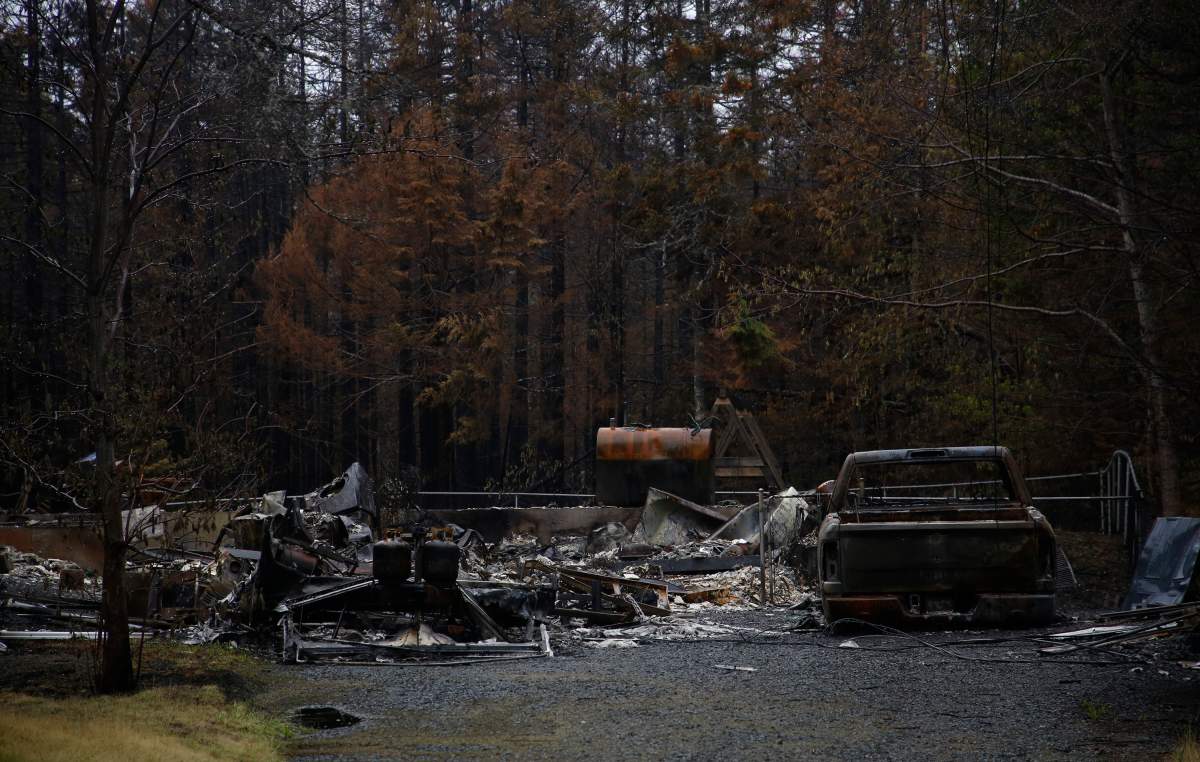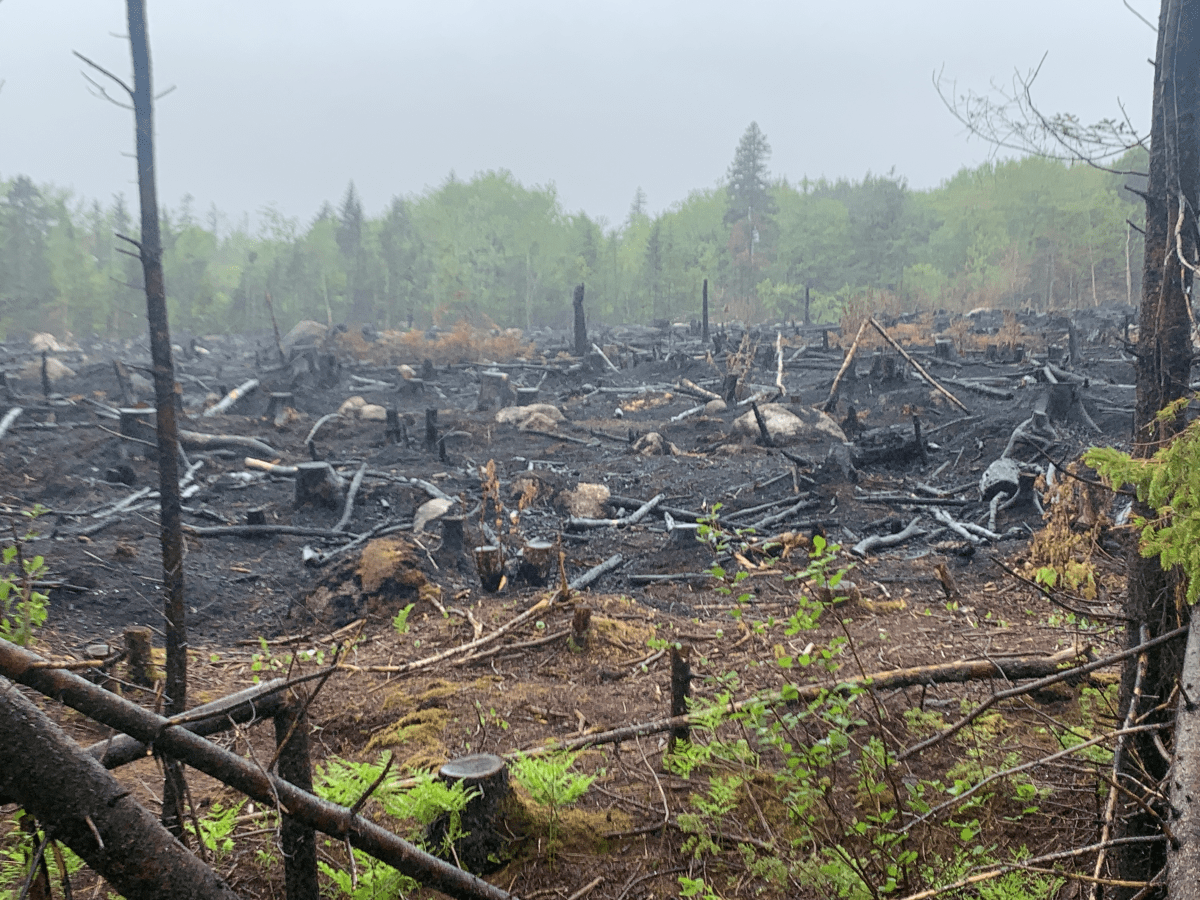Housing concerns are mounting in Nova Scotia due to the devastation caused by the wildfires over the last couple of weeks.

More than 200 homes have been lost to the flames: officials have said about 60 were destroyed in the Barrington Lake wildfire in Shelburne, while the fire in the Tantallon area of Halifax Regional Municipality claimed 150.
Mark Stein, a realtor in Nova Scotia with more than 30 years’ experience, said the impacts are already being felt.
“A month ago, before the fires, we were getting multiple offers on most homes, if priced appropriately. Probably four or five — up to six — offers on each home,” he said.
Since the fires, “I’ve seen that dramatically change, that we now have 12 to 16, or even 20 offers on the average home,” said Stein.

He believes that many wildfire victims will be looking to buy a “transition home” — somewhere to live for two or three years while their home is rebuilt.
But that can be hard to do. He said the nature of many of the destroyed homes — mostly detached, single-family homes — make it difficult for people to find a similar one.
As well, apartments are hard to come by, especially for those who are looking for a yard for their pets and kids. The vacancy rate in the Halifax area is currently around one per cent.
“If you have a family of parents and two children, a pet or two, finding an apartment is a tough thing to do in Halifax these days,” he said.
Matthew Dauphinee, the president of the Nova Scotia Association of Realtors, said it’s hard to gauge the impact as it’s still early after the disaster.
In the immediate term, it’s crucial to find somewhere for everyone to stay. He said right now many students in Halifax have gone home for the summer, but he expects a “second wave” of impact when they return in the fall.

Get breaking National news
Longer-term, Dauphinee said there was already a high demand for homes, so “of course, losing that number of homes, it’s going to have an impact.”
“The front line right now is the insurance companies — people are sort of coming to understand what the coming months (are) going to look like for them,” he said.
He said the demand will fall on the construction industry which must work to rebuild as quickly as possible.
- ‘At first I cried’: How Iranian Canadians are reacting to the U.S. strikes in Iran
- Khamenei’s death met with ‘jubilation’ among Iranian-Canadians: Liberal MP
- Attack on Iran triggers global flight disruptions, impacts Canadian travellers
- Carney calls for protection of civilians as U.S., Israel strike Iran
More housing needed
In an interview, opposition Liberal leader Zach Churchill said the loss of those homes was a “traumatic experience for a lot of people.”
“Hundreds of Nova Scotians have essentially lost everything: their homes, many of them have lost their vehicles, and of course all their personal belongings,” he said.
“So this is a very traumatic situation, and we’re also concerned about people’s ability to find alternative housing.”
Churchill noted that not only did Nova Scotia have a shortage in housing stock, but also labour shortages in the construction industry.

In the short term, he said the province needs to find lodging for the affected people, as well as providing additional funding to help people get through this situation. He said the $500 promised to everyone displaced by the fire isn’t enough.
“This is probably going to be a year or more of people waiting to even start the rebuilding process,” he said.
“The provincial government is going to need to be there to provide some financial support as these people wait for their homes to be rebuilt, because we certainly know that the insurance coverage that they have isn’t going to go on for an extended period of time, but the situation itself is.”
Longer-term, he said the province needs more housing supply.
“People needed places to stay before the wildfire put hundreds more out of their homes,” he said. “The situation is not going away anytime soon.”
In a statement, Department of Housing spokesperson Krista Higdon said the province is working on establishing modular options for families displaced from their homes while they recover, repair or rebuild.
She said the province is seeking input from the affected residents as they do so.
“It’s important we understand individual family needs, to ensure these options are what people want and are where they need them to be, and that will determine how we move forward,” the statement said. “We will have more information to share soon.”
Higdon said 211 is able to provide resources to help support those who lost homes.
“Information has been compiled for temporary housing via universities’ dorm rooms and intermediate or long-term housing via rental units,” she said.
“Landlords have identified contact persons to receive inquiries from affected families and match them with available housing in their communities. Work is also underway to collect and coordinate offers from individual property owners.”
Gary Burrill, NDP spokesperson for residential tenancies, said the issue highlights the need for more housing in the province, especially affordable housing.
“The government has not invested in a creative or energetic way, at all, in affordable housing, and now, in a very serious and difficult way, these chickens are coming home to roost,” he said.
He said he has heard from displaced residents who were “astonished” by current rental prices.
“The rents are double, triple what they are paying for their mortgage, for places that are much smaller,” he said.

While Nova Scotia has a two-per cent rent cap, Burrill said rent is continuing to spiral out of control through the “misuse” of fixed-term leases — where a landlord can end a lease without giving a reason, then jack up the rent for the next tenant.
He said the aftermath of the fire presents a “perfect” moment for the province to address the fixed-term lease issue.
Meanwhile, Stein is telling people who lost their homes to have patience and not lose hope.
“Have faith. You will find another home, and then you will have your family together and they’ll be happy again,” he said.
“It will take time. But it can be done and it will be done.”
Dauphinee, with the Nova Scotia Association of Realtors, also offered some words of encouragement.
“It’s a tragic loss. The impact of it is going to be felt for a while, but … the response that we got from emergency services, the ability for lives to be saved, most importantly, is probably the biggest factor,” Dauphinee said.
“At the end of the day, if you’ve got your health and safety, we can rebuild from that.”











Comments
Want to discuss? Please read our Commenting Policy first.